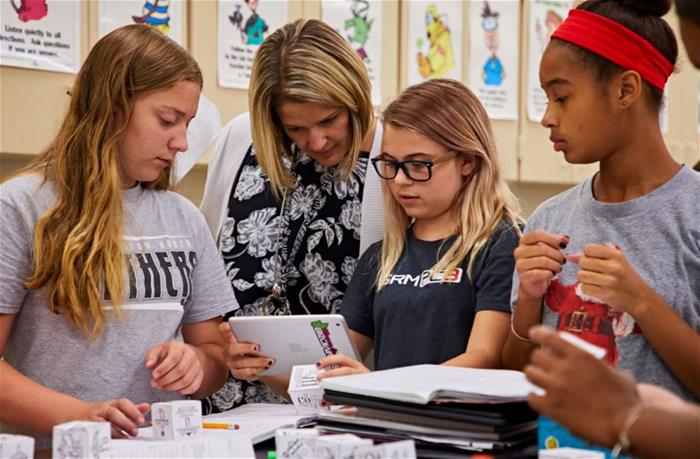
By Karen K. Garza, Ph.D.
Our world has been transformed in just the past few decades, requiring school system leaders to re-imagine the educational experience for all students. This experience must include not only the purposeful integration of rigorous academic content, but it must also be more intentional about fostering critical thinking, communication, collaboration, creativity, and other 21st century skills that our students need to thrive in a rapidly changing economy. With that comes a need to also reevaluate how we define—and measure—the success of our school systems.
The shifting policy landscape has created conditions ripe for school leaders to transform their schools around a collective
community-wide vision for all students—a vision that is locally developed, but globally positioned. This is an exciting time for school systems in the United States. This new landscape also presents policymakers with a similarly exciting opportunity to redesign state systems of assessment and accountability to advance 21st century learning for every student.
What should be the role of state-level assessment and accountability in ensuring that all students have educational experiences that prepare them to be lifelong learners and contributors?
The
2017 PDK Poll offers a glimpse into how the American public defines school quality. Poll respondents said that the most important factor in school quality is how well the school helps students learn skills like being cooperative, respectful of others, and persistent at solving problems. Having advanced academic classes is also seen as an important factor in measuring the quality of a school. It’s also important to note that 66 percent of Americans still believe that schools should be held accountable.
So it’s not a question of
if we should have accountability in schools but
how we should reshape accountability systems to better support the needs of students, educators, and their local communities in the 21st century.
New models of accountability can be informed by the past, but the design of these models should be framed using balanced assessment and accountability frameworks that recognize and value local accountability as much as state accountability.
Historically, state-level assessments have been developed around what is easy to measure, not necessarily what matters most to support students’ long-term success. As school systems embrace new ways of preparing the whole child, more complex, comprehensive models of assessment are needed to measure progress around this changing definition of success. These new models of assessment—such as project-based assessment, student-led assessment, and performance-based assessment—require more time, intensive professional learning, and more support for educators to employ in the classroom. But when done well, they provide educators, students, and parents with much richer information about students’ learning and future readiness.
For policymakers considering the next era of educational accountability systems, it’s important to focus on the primary purpose and overall feasibility of statewide systems of accountability. It would be ill-advised to consider measuring some 21st century skills in a state accountability system. For example, many school systems have identified collaboration as a key skill for students to succeed in this dynamic, global economy. Currently, there are no efficient or valid models in use at the state level for assessing students’ collaboration skills, nor are there models that are reliable for comparative use across districts or states. However, collaboration skills may be assessed in the local context by educators working together to calibrate evidence of success in working with their students.
As we work to transform our school systems to make 21st century learning a reality for every student, there remains an important role for state accountability and assessment systems to periodically determine if a school system is meeting the needs of all students in certain critical content areas and at certain grade levels. But this should be part of a balanced assessment and accountability framework in which school leaders have the flexibility to augment state reporting with more frequent local reports about progress on measures that are important to parents and the broader community, including the development of 21st century skills.
Every school system is unique. So before embarking on the design of a local assessment and accountability system, engage students, educators, parents, business leaders, and other community stakeholders in creating a shared vision for your system. Consider: What are the hopes, aspirations, and dreams that our community has for its students? What knowledge, skills, literacies, and mindsets do our students need to be future ready? This vision then provides a foundation for developing a local assessment and accountability system that measures what’s important in your community.
Many school systems across the country have engaged their larger community in developing a Portrait of a Graduate, a collective vision that articulates the community’s aspirations for all students. Visit
PortraitofaGraduate.org to learn more and get started.
Karen K. Garza, Ph.D., is the President and CEO of Battelle for Kids. Connect with her on Twitter at @KGarzaBFK.